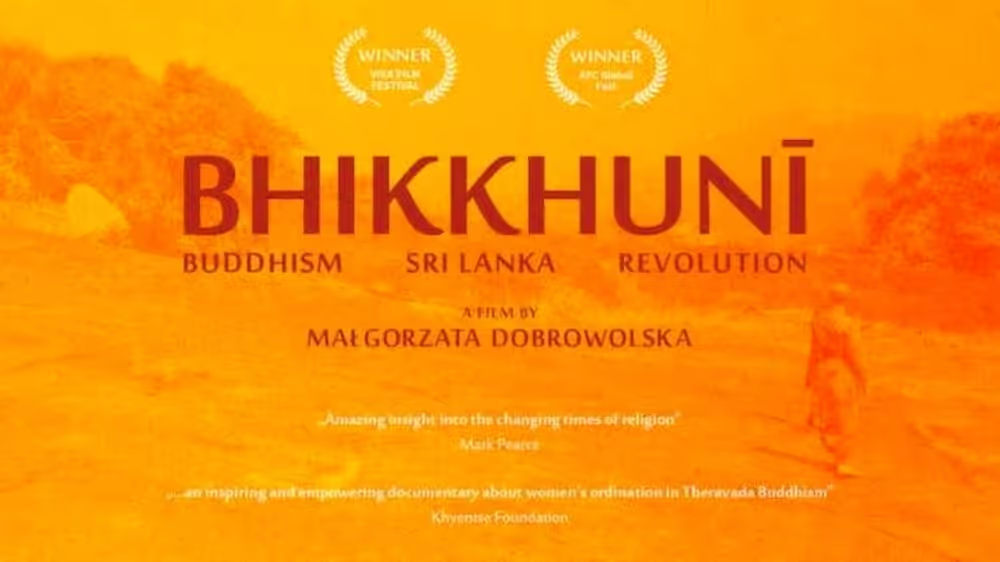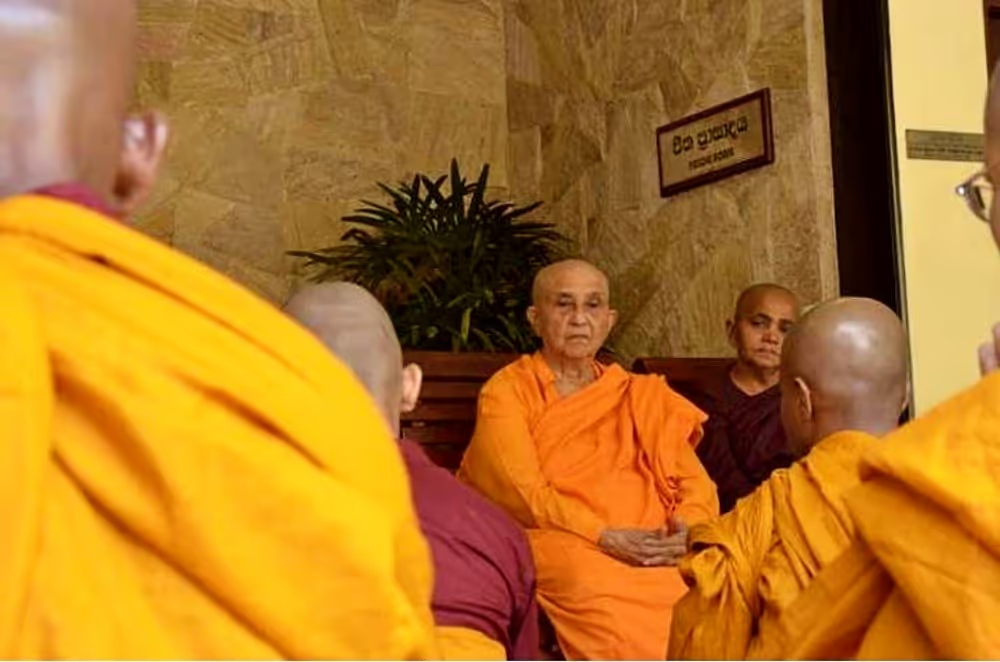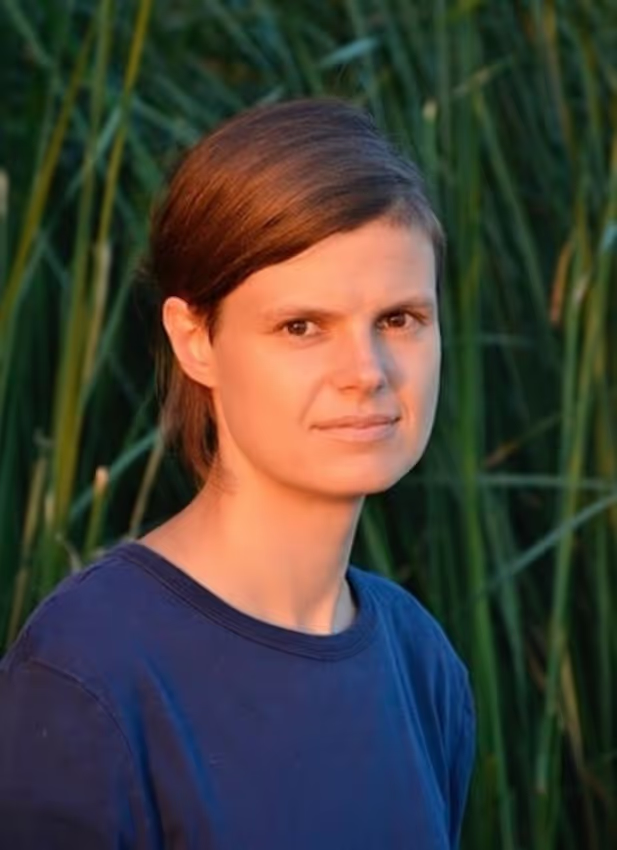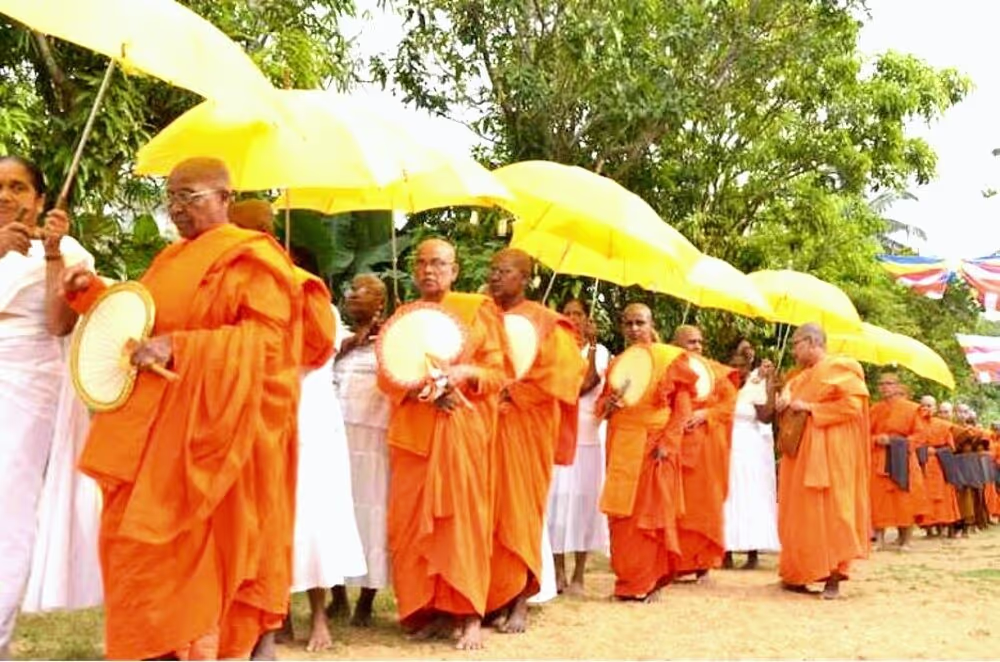
Many of the most dramatic episodes related to women's ordination in Theravāda Buddhism have occurred in Thailand, where press attention has focused on prominent figures such as Ajahn Brahm (now expelled from communion with the sangha founded by Ajahn Chah) and the venerable Dhammananda, two standard-bearers of the women's ordination movement. However, it was in Sri Lanka that the policy of women's ordination really succeeded for the first time in 1998, with the ordination of a group of Bhikkhunis Theravada assisted by Chinese nuns following the Vinaya Dharmaguptaka. However, this was only the beginning of a long struggle for the full recognition of women as fully ordained teachers in Sri Lanka. It is this struggle, with all its progress and obstacles, that the filmmaker Małgorzata Dobrowolska documents in Bhikkhunī: Buddhism, Sri Lanka, Revolution.
Ever since she can remember, Małgorzata, born in Poland, has been concerned about the unequal status between men and women in the Roman Catholic Church, the spiritual tradition in which she grew up. “Even as a child, I wondered why a woman could not be ordained as a priest. Later I realized that this inequality is present in every major religion in the world. I started looking for women who would break with these patterns,” says Małgorzata. While developing her professional identity as an activist and documentary filmmaker focused on women's stories, her interest in Buddhism initially led her to Thailand.
“In 2015, I was in Thailand at Songdhammakalyani Monastery. This is the first monastery of bhikkhunis in this country,” he says. “The director of the monastery is Bhikkhuni Dhammananda, the first fully ordained Theravāda nun in Thailand. Being in this monastery made a great impression on me. I met a community of exceptional women who are not recognized by the government and most Thai monks, along with a part of the lay people. The origins of the Thai order of bhikkhunis are in Sri Lanka. It was there that the venerable Dhammananda, one of the protagonists of my documentary, received full ordination in 2003.
For Małgorzata, filming was a great adventure: “Of course, I sometimes had difficult or stressful situations. I arrived in Sri Lanka completely alone. I didn't know this country well. When I was leaving Poland, I didn't know if any of the nuns would accept being the protagonists of this documentary. It turned out that my concerns were completely unfounded. The nuns welcomed me very warmly and I immediately felt at home. They were so eager to share their stories, fears and goals with me. They introduced me to their world. I felt that it was also important for them to be able to tell their stories themselves, to record the story of the reestablishment of the order of bhikkhunis.”

Sri Lanka played a key role in the history of the creation of the order of bhikkhunis after the daughter of Ashoka the Great, the nun Sanghamitta, established the lineage on the Island. “Today it is even more important in the revival of the lineage in South Asia,” Małgorzata observes. “Many women who cannot receive full ordination in their countries come to Sri Lanka to become bhikkhunis, and then return to their countries of origin. I had the great fortune to be able to record the International Ordination of Bhikkhunīs Theravada 2016 on film. It was a historic event. Women from Bangladesh, Thailand and Vietnam came from their respective countries to be ordained. The Bangladeshi women's group was the first group of Theravada bhikkhunis in their country. The leader of this group was a nun named Gautami, who became the first Buddhist bhikkhuni in Bangladesh.”
The film was shot in Sri Lanka, but the main characters are women from three different countries: the Venerable Kusuma of Sri Lanka (ordained in 1996 in India), the Venerable Dhammananda of Thailand (ordained in 2003 in Sri Lanka), and the Venerable Gautami of Bangladesh (ordained in 2016 in Sri Lanka). All of them are the first women in the modern history of their respective countries to become fully ordained nuns.

However, even in Sri Lanka, the idea of ordaining female monastics has had a mixed reception. “The situation for bhikkhunis in Sri Lanka is by far the best in the context of countries where Theravada Buddhism is the main religion. Some of the monks in Sri Lanka support women's ordination,” Małgorzata explains. “It is thanks to them that the line of bhikkhunis was successfully re-established, and new international ordinations are being organized. But even so, the government and a large number of monks do not recognize bhikkhunis. Certainly, the Sri Lankan government does not imprison women for trying to become fully ordained nuns, and even the strictest Orthodox monks don't force women to give up their habits. So you could say that the island is moderately tolerant of the bhikkhuni movement”
The pace of progress is not entirely due to Vinaya concerns or sexist attitudes. There are genuine institutions that allow “gray” areas to overlap with the more distinctive roles of “lay women” or “bhikkhunis”, such as House Sun Matas, who live according to ten precepts, but are not considered ordained monastics. Since the idea of House Sun Matas It is a relatively recent import from Myanmar (from about a century ago) and is similar to the institution Mae Chee in Thailand, Małgorzata believes that this is not a sustainable situation in a country like Sri Lanka, where women's ordination along the lines of Vinaya Theravada has been reconstituted. “It's similar to waiting for a doctor in a waiting room, without having the opportunity to actually enter the doctor's office,” he says.

Małgorzata argues that the most important thing is the recognition of the order of bhikkhunis by the laity and the awareness of the situation of the female order. “I think the crucial thing is education about the history of bhikkhunis, as well as increasing awareness of the importance of the fact that the restoration of female ordination has been achieved,” she observes. “This applies not only to Sri Lanka, but to the entire world.”
Currently, Małgorzata is distributing the film, which he concedes is the most difficult task in the filmmaking process. “In modern society, we are being bombarded with advertisements and offers around every corner, making it very difficult to cut through this commercial noise and offer the public a full-length documentary about the revival of female ordination in Theravada Buddhism. Even so, this is a very important topic and people don't realize that in Theravada Buddhism, one of the oldest and greatest Buddhist traditions, there has been such a great breakthrough or even a revolution. After a thousand years, women can once again be fully ordered. The sangha is returning to the state the Buddha wanted. It's very important to be aware of this and to support it.”
*This article was originally published on Buddhistdoor Global on April 2, 2019.










